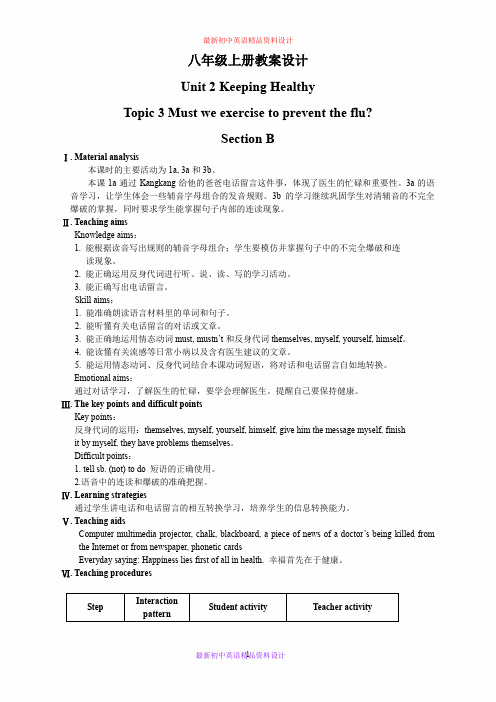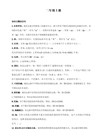人教八年级英语上册Unit 2第3课时教案
八年级上册英语教案 人教版八年级英语教案

八年级上册英语教案人教版八年级英语教案【篇一】八年级上册英语教案2022年新目标英语八年级上全册教案2022年下期八年级英语全册教案(人教版)Unit 1 Where did you go on vacation?Section A 1 (1a-2d)一、教学目标:1. 语言知识目标:1) 能掌握以下单词:anyone, anywhere, wonderful, quite a few, most, something, nothing, everyone, of course, myself, yourself能掌握以下句型:① —Where did you go on vacation? —I went to the mountains.② —Where did Tina to on vacation? —She went to the beach.③ —Did you go with anyone?2) 能了解以下语法:—复合不定代词someone, anyone, something, anything等的用法。
—yourself, myself等反身代词的用法。
3)一般过去时态的特殊疑问句,一般疑问句及其肯定、否定回答。
2. 情感态度价值观目标:学会用一般过去时进行信息交流,培养学生的环保意识,热爱大自然。
二、教学重难点1. 教学重点:1) 用所学的功能语言交流假期去了什么旅行。
2) 掌握本课时出现的新词汇。
2. 教学难点:1) 复合不定代词someone, anyone, something, anything等的用法。
2) yourself, myself等反身代词的用法。
三、教学过程Ⅰ. Lead-in1. 看动画片来进入本课时的主题谈论上周末做了些什么事情,谈论过去发生的事情。
Ⅱ. Presentation1. Show some pictures on the big screen. Let Ss read the expressions.2. Focus attention on the picture. Ask: What can you see? Say: Each picture shows —Yes, I did./No, I didn’t.something a person did in the past. Name each activity and ask students to repeat: Stayed at home, Went to mountains, went to New York City 6. Went to the beach, visited my uncle, visited museums, went to summer camp3. Now, please match each phrase with one of the pictures next to the name of the activity,point to the sample answer.4. Check the answers. Answers: 1. f 2. b 3. g 4. e5. c6. a7. d III. Listening1. Point to the picture on the screen.Say: Look at the picture A. Where did Tina go on vacation? She went to mountains. Ask: What did the person do in each picture?2. Play the recording the first time.3. Play the recording a second time.Say: There are three conversations. The people talk about what did on vacation. Listen to the recording and write numbers of the namesin the right boxes of the picture.4. Check the answers.IV.Pair work1. Point out the sample conversation. Ask two Ss to read the conversation to the class.2. Now work with a partner. Make your own conversation about the people in the picture.3. Ss work in pairs. As they talk, move around the classroom and give any help they need.4. Let some pairs act out their conversations.V. Listening1. Tell Ss they will hear a conversation about three students’ conversations. Listen for the first time and fill in the chart. Then listen again and check Yes, or No.2. Let Ss read the phrases in the chart of 2b.3. Play the recording the first time. Ss listen and fill in the chart.4. Play the recording a second time for the Ss to check “Yes, I did.” or “No, I didn’t. ”5. Check the answers with the Ss.VI. Pair work1. Let two Ss read the conversation between Grace, Kevin and Julie.2. Let Ss work in pairs and try to role-play the conversation.3. Ask some pairs to act out their conversations.VII. Role-play1. First let Ss read the conversation and match the people and places they went.2. Let Ss act out the conversations in pairs.3. Some explanations in 2d.Homework:用英语询问你的一位好朋友,她(他)假期去了哪里?看到了什么?并将此对话写在作业上。
人教版八年级英语上册教案Unit 2 第3课时

第三课时Section A(Grammar Focus-3c)重点单词maybe ad v.大概;或许;可能least ad v.最小;最少adj.&pron.最小的;最少的重点短语stay up late熬夜到很晚at least至少;不少于;起码重点句子1.I go to the movies maybe once a month.我大概一个月看一次电影。
2.He plays at least twice a week.他至少一周踢两次(足球)。
教学难点掌握有关做事的频率的问答观察下列句子的画线部分,并总结规律。
1.—What do you usually do on weekends?—I always exercise.2.—What do they do on weekends?—They often help with housework.3.—What does she do on weekends?—She sometimes goes shopping.4.—How_often do you go to the movies?—I go to the movies maybe once_a_month.5.—How_often does he watch TV?—He hardly_ever watches TV.6.—Do you go shopping?—No,I never go shopping.结论:①常见的频度副词有always、usually、often、sometimes、occasionally、seldom、rarely、hardly_ever、never(按频率大小排序)等。
②常见的表示频率的短语有once a week、twice a day、three times a month、every day等。
③对表频率的副词或短语提问用how_often(多久一次)。
仁爱初中英语八年级上册精品教案设计 Unit 2 Topic 3Section B

八年级上册教案设计Unit 2 Keeping HealthyTopic 3 Must we exercise to prevent the flu?Section BⅠ. Material analysis本课时的主要活动为1a, 3a和3b。
本课1a通过Kangkang给他的爸爸电话留言这件事,体现了医生的忙碌和重要性。
3a的语音学习,让学生体会一些辅音字母组合的发音规则。
3b的学习继续巩固学生对清辅音的不完全爆破的掌握,同时要求学生能掌握句子内部的连读现象。
Ⅱ. Teaching aimsKnowledge aims:1. 能根据读音写出规则的辅音字母组合;学生要模仿并掌握句子中的不完全爆破和连读现象。
2. 能正确运用反身代词进行听、说、读、写的学习活动。
3. 能正确写出电话留言。
Skill aims:1. 能准确朗读语言材料里的单词和句子。
2. 能听懂有关电话留言的对话或文章。
3. 能正确地运用情态动词must, mustn’t和反身代词themselves, myself, yourself, himself。
4. 能读懂有关流感等日常小病以及含有医生建议的文章。
5. 能运用情态动词、反身代词结合本课动词短语,将对话和电话留言自如地转换。
Emotional aims:通过对话学习,了解医生的忙碌,要学会理解医生。
提醒自己要保持健康。
Ⅲ. The key points and difficult pointsKey points:反身代词的运用:themselves, myself, yourself, himself, give him the message myself, finishit by myself, they have problems themselves。
Difficult points:1. tell sb. (not) to do 短语的正确使用。
2.语音中的连读和爆破的准确把握。
【人教版】八年级英语上册 Unit 2 全单元英文教案

Unit 2 How often do you exercise?Language Goal 【语言目标】Talk about how often you do things:in this unit,students learn to talk about what things they do and how often they do these things.Knowledge Goals 【知识目标】Key Wordshousework,hardly,ever,once twice,full,maybe,least,junk,coffee,health,percent,online,although,through,mind,body,such,together,die,writer,dentist,magazine,however,than,almost,less,pointKey Phraseshow often,on weekends,go to the movies,hardlyever,twice a week,three times a week,be goodfor,at least,such as,less than,more than Key Sentences1. How often do you exercise?2.What do you usually do on weekends?Key Grammar1. The use of adverbs of frequency.2.“How often” cause of special questions andanswers.Ability Goals 【能力目标】1. Through the learning to gain the ability to talk about how often people do things.2.Write a report about how often people do things.Moral Goals 【情感目标】1. Keep a diary every day.2.Do more exercise and develop good habits to keep healthy.Teaching Time 【课时】Five periodsPeriod 1 Section A(1a-2d)Period 2 Section A(Grammar Focus-3c)Period 3 Section B(1a-1e)Period 4 Section B (2a-2e)Period 5 Section B (3a-Self Check)本单元的教学内容围绕“多久做一次运动”这一话题展开。
人教版八年级上英语unit2教案

Step5.Groupwork
(1). Get the class to read the eight items in groups and try to understand the phrases.
② A: What’s the matter?
B: She/He has a cold/ sore throat /stomachache…
A: She/He should see a doctor/ have a rest/ take some medicine…
If your group get the most stars, your will be the winner.
Step4. Learn the illness
(1).Give the students an example:
Hold the head and say: I have a headache.
S: I have a headache.
Ss: You should go to see a doctor.
(5). Get the students to read the conversation in 3a and fill in the blanks. Then read the passage in groups or in pairs. Then ask the class to make a similar conversation and role play it in front of the class.
新人教版八年级英语上册Unit3 教案

新人教版八年级英语上册Unit3 教案本教案针对新人教版八年级英语上册Unit3的教学内容。
该单元主要包含以下两大话题:1)时间和频率表达方式;2)日常活动及其规划。
通过教学,学生将能够熟练运用常用的时间和频率表达方式,并能够描述日常活动并做出相应的规划安排。
1.能够运用常见的时间和频率表达方式,如days of the week。
months of the year。
at。
on。
in。
every等;2.能够描述日常活动,并能够就日常活动做出规划安排;3.能够流利地使用所学词汇和句型进行交流。
1.时间和频率表达方式的准确运用;2.描述日常活动的基本句型的运用。
第一课时1.教授并练days of the week;2.学生进行日常活动的描述和规划。
1.复并巩固days of the week;2.教授并练months of the year;3.学生进行月份与日常活动的搭配练。
1.复并巩固days of the week和months of the year;2.教授并练at。
on。
in等时间表达方式;3.学生进行日常活动时间的描述练。
1.复并巩固时间表达方式;2.教授并练every的用法;3.学生进行日常活动规划的练。
1.情境教学法:通过创设真实的情境,让学生在实际生活中应用所学知识;2.合作研究法:通过小组合作研究,鼓励学生相互交流和合作,提高研究效果;3.游戏教学法:通过游戏形式激发学生的兴趣,提高研究积极性。
1.针对每一课时的研究内容,设计相应的练题进行评估;2.利用小组活动和教师提问的方式进行课堂实时评估;3.通过学生的作业和考试成绩,对研究效果进行总体评估。
1.教材:新人教版八年级英语上册Unit3;2.多媒体设备:投影仪、音响等;3.黑板和白板笔。
通过教材分析,我将采用情境教学法、合作研究法和游戏教学法等多种教学方法,来激发学生研究的兴趣,提高研究效果。
同时,将充分利用教学资源,使课堂内容更加生动有趣。
Unit2SectionAGrammarfocus3c教案人教版英语八年级上册
Unit 2Grammar focus3c一、教学内容:Grammar focus3c二、课型:语法课三、语篇研读What(主要内容):语法部分从询问某人从事某活动的问句和答句为主线,然后将对应的问句和答句匹配。
学生通过问句和答句的人称主语以及活动内容找到答案。
3c将学生从笔头训练转到口语训练,谈论自己和身边的同学关于学习英语的相关情况和频率。
Why(编写意图): 学生能通过谈论活动事项来强化对频率表达的学习和运用,让学生养成良好的生活习惯,保持积极阳光的心态学习和生活。
How(语篇特点):以表格形式列出本单元语法句型,总结语法点,对应练习的凸显出人称代词和谓语动词在做题中的重要性,同时巩固频率的语言表达。
四、教学目标通过本课时学习,学生能够:1.(学习理解)掌握本单元的语法和句型,正确使用How often引导的特殊疑问句询问从事活动的频率以及运用频度副词描述从事活动的频率。
2.(应用实践)采用学生资助观察、合作探究、发现总结的模式,引导学生掌握语法知识,注重独立思考能力和合作探究能力的培养。
3.(迁移创新)以练习、对话形式锻炼学生对频度副词的掌握情况;同时培养学生对英语的学习兴趣和语言运用能力,合作探讨英语学习方式,激发学生对英语学习的思考。
五、教学重难点1.常用频度副词及短语在句中的用法;3.一般现在时中谓语动词的第三人称单数形式;4.频度副词在句中的位置。
【核心词汇】maybe, once, never, early, exercise【核心短语】help with housework. go shopping, go to movies, stay up late.【核心句型】What do you usually do on weekends? I always exercise.What do they usually do on weekends? They often help with housework.Do you go shopping? No, I never go shopping五、教学过程六、板书设计Unit2 Grammar focus3cWhat do you usually do on weekends? I always exercise/ go to movies.What do they usually do on weekends? They often help with housework.Do you go shopping? No, I never go shopping/ stay up late.How often does he watch TV? He hardly ever watches TV.主谓一致。
八年级英语上册 Unit 2 How often do you exercise Section A(Grammar focus-3c)教案 (新版)人教新目标
3.句型What do you usually do on weekends? How often…?及其答语;
4.复习一般现在时表行为习惯的用法。
教学
难点
运用频率副词谈论自己及他人的日常生活;
一般现在时疑问句中人称主语与助动词的搭配,第三人称单数动词的变化。
Practice in pairs.
A: What does…do on weekends?
B: He / She…..
A: How often does he / she…?
B: He / She .....
4.Sts do some exercises.
1)你通常在Biblioteka 未做什么?____ ____ you _______ do on weekends?
一、教材分析
本部分在Section A所输入语言知识的基础上,利用表格的形式梳理出本单元的语法学习要点。
3a-3c引导学生进一步体会、运用并巩固上述目标语言。
活动3a首先让学生用do或does补全How often…?问句或“询问某人是否从事某项活动”的一般问句,然后将问句和对应的答语匹配。学生需要判断问句的类型,并抓住问句和答语中的人称主语及活动内容等关键信息。这是一个关注语言结构的练习。活动3b让学生将所给词语连成问句从而关注How often…?What…usually do on week?句型中的语序及其回答。活动3c从笔头训练过渡到口头训练,让学生综合运用所学语言,调查小组成员从事不同活动的频率。
4.询问活动频率的问句How often…?及其答语;
5.询问某人是否从事某项活动的问句及其答语6.复习一般现在时表行为习惯的用法;
人教版八年级英语上册教材Unit2 教案
人教版八年级英语上册教材Unit2 教案
教学目标
- 通过本课的研究,学生能够掌握有关物品地点的表达方式,
如商店、电影院等。
- 学会使用“where”的疑问句和回答句来询问和描述物品的地点。
- 能够熟练运用所学知识与同伴进行交流,并进行情景对话。
教学重点
- 学会使用“where”的疑问句和回答句来询问和描述物品的地点。
- 熟练掌握单词和短语的拼写和发音。
教学准备
- 教材:人教版八年级英语上册教材Unit2
- 幻灯片或黑板
- 学生小组卡片
教学步骤
1. 导入:用幻灯片或黑板上展示一些物品图片,引导学生用英
语描述物品的地点。
2. 研究新知:通过教材Unit2的相关内容,教授目标词汇和短语,让学生理解并记忆。
3. 练活动:进行对话练,学生分组,每个小组选择一个物品进行情景对话,询问和回答物品的地点。
4. 拓展活动:让学生运用所学知识,创造自己的对话,交流物品的地点。
5. 归纳总结:让学生回顾所学知识,进行总结归纳。
6. 作业布置:布置课后作业,要求学生练复述本课内容,并使用疑问句和回答句描述物品地点。
教学评价
- 通过学生的课堂表现、练活动和讨论活动来进行评价,检查学生是否能够正确运用所学语言进行物品地点的描述。
- 提供及时的反馈,鼓励学生用英语进行交流。
注意事项
- 确保课堂秩序,引导学生积极参与。
- 注重学生的口语能力培养,鼓励他们进行对话练。
- 提供足够的练机会,让学生熟练掌握所学知识。
以上为人教版八年级英语上册教材Unit2的教案,根据课堂实际情况适当调整教学步骤。
人教版八年级上册英语全册教案
◆Step9 Challenge 挑战自我
补全对话(见课件)
设计意图
通过此环节,使学生完成 2d 中的语言目标。
◆Step10 Summary
总结本节课语言知识点(见课件)。
设计意图
梳理本课的知识要点。
◆Step11 Homework
Makeaconversationaboutwhatyoudidlastweek.
Unit1 Wheredidyougoonvacation
教学课题
第一课时 SectionA(1a-2d)
教学目标
【知识目标】 Importantwords:anyone,anywhere,wonderful,few,most Importantphrases:quiteafew,onvacation,anythinginteresting Importantsentences: 1.Wheredidyou/he/she/theygoonvacation 2.Didyou/he/she/theygotoCentral Park
◆Step7 Pairwork 2c
以小组为单位分角色表演,完成 2c。(见课件)
设计意图 加强情景交际,进一步巩固一般过去时的特殊疑问句和一般疑问句。
◆Step8 Role-playtheconversation 2d
1.Fastreading:
Read2dandanswerthequestions.(见课件)
PreviewSectionB(1a-2e)
板书设计
SectionA(GrammarFocus-3c)
指代人的不定代词
指代物的不定代词
anyone,everyone,noone
something,anything,everything,
- 1、下载文档前请自行甄别文档内容的完整性,平台不提供额外的编辑、内容补充、找答案等附加服务。
- 2、"仅部分预览"的文档,不可在线预览部分如存在完整性等问题,可反馈申请退款(可完整预览的文档不适用该条件!)。
- 3、如文档侵犯您的权益,请联系客服反馈,我们会尽快为您处理(人工客服工作时间:9:00-18:30)。
人教八年级英语上册Unit 2第3课时教案
第三课时Section A(Grammar Focus-3c)
重点
单词
maybe ad v.大概;或许;可能
least ad v.最小;最少adj.&pron.最小的;最少的
重点
短语
stay up late熬夜到很晚
at least至少;不少于;起码
重点
句子
1.I go to the movies maybe once a month.我大概一个月看一次电影。
2.He plays at least twice a week.他至少一周踢两次(足球)。
教学
难点
掌握有关做事的频率的问答
观察下列句子的画线部分,并总结规律。
1.—What do you usually do on weekends?
—I always exercise.
2.—What do they do on weekends?
—They often help with housework.
3.—What does she do on weekends?
—She sometimes goes shopping.
4.—How_often do you go to the movies?
—I go to the movies maybe once_a_month.
5.—How_often does he watch TV?
—He hardly_ever watches TV.
6.—Do you go shopping?
—No,I never go shopping.
结论:①常见的频度副词有always、usually、often、sometimes、occasionally、seldom、rarely、hardly_ever、never(按频率大小排序)等。
②常见的表示频率的短语有once a week、twice a day、three times a month、every day等。
③对表频率的副词或短语提问用how_often(多久一次)。
环节1新课导入
T:In the last lesson,we have learned some common adverbs and phrases about frequency,such as al w ays,often,sometimes,ne v er,t w ice a w eek,three times a w eek and so on.Today,we'll continue to learn more about how to use them during our daily life.
设计意图:温故知新,通过陈述之前所学内容,帮助学生记忆有关频率的副词或短语,有利于知识间的衔接,便于老师循序渐进地开展教学。
环节2学习Grammar Focus-3c
1.让学生朗读Grammar Focus中的句子,并尝试总结句子的规律。
2.老师向学生讲解Grammar Focus中的语法点。
3.让学生补全3a的句子,然后把问句和回答搭配起来。
教师核对答案。
4.让学生就3b的提示信息组成问句,然后与同伴进行问答练习,并做记录。
老师挑选一两组学生当堂表演。
5.让学生小组合作,想出更多提高英语的好办法。
然后就采用每种方法学习的频率互相提问,从而选出最佳的学习英语的方法。
每组派出一名代表汇报该组的讨论情况。
6.要点点拨。
频度副词
①含义:表示次数、频率的副词称为频度副词。
②频度副词在句中的位置:be动词、情态动词、助动词之后,实义动词之前;有时为了表示强调,也可放在句首或句末。
③用法:a.always、usually、often等通常与一般现在时连用,表示经常或反复发生的动作。
b.always与现在进行时连用时,并不强调动作正在进行,而是表示一种赞扬或厌烦的情绪。
例:You're always making mistakes.
你老是犯错。
7.学以致用。
(按要求完成句子)
(1)I go to the movies twice_a_month.(对画线部分提问)
How_often do you go to the movies?
(2)他老是向我借钱,这让我觉得很糟糕。
(根据汉语意思完成句子)
He is_always_borrowing money from me,which makes me feel terrible.
设计意图:通过让学生观察并总结语法规律,提高学生自主学习的能力;通过3a到3c的学习,让学生学以致用,巩固本单元语法知识的运用。
Unit 2 How often do you exercise?
Section A (Grammar Focus-3c)
maybe least at least I go to the movies maybe once a month.
He plays at least twice a week.
请完成本课对应训练!。
